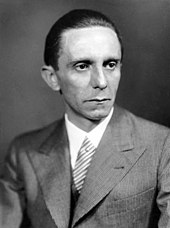The Rothschilds (film)
| The Rothschilds | |
|---|---|
| Directed by | UFA |
| Distributed by | UFA |
Release date |
|
Running time | 97 minutes |
| Country | Nazi Germany |
| Language | German |
The Rothschilds (Die Rothschilds) is a 1940 Nazi German historical propaganda film directed by Erich Waschneck.
The film is also known as The Rothschilds' Shares in Waterloo (International recut version, English title). It portrays the role of the
Plot summary
As William I, Elector of Hesse refused to join the French supporting Confederation of the Rhine at its formation in 1806, he is threatened by Napoleon. In Frankfurt, he asks his agent Mayer Amschel Rothschild to convey bonds worth £600,000 he has received from Britain to subsidise his army to safety in England.
Rothschild however uses the money for his own ends, with the help of his sons, Nathan Rothschild in London and James Rothschild in Paris. They first use the money to finance Wellington's army in Spain's war against Napoleon, at advantageous terms of interest. In a notable coup, in 1815, Nathan spreads the rumour that Napoleon had won the Battle of Waterloo, causing London stock prices to collapse. He then bought a large quantity of equities at the bottom of the market, profiting handsomely as prices rose once the truth about the battle emerged. In a decade, the Rothschilds have accumulated a fortune of £11 million by using the Elector's money.
Nathan returns the original capital to the Elector, plus only a small amount of interest, keeping the great bulk of the profits for the Rothschilds, and plans to formalise a Europe wide network of family led financial institutions.
The film ends with a declaration that, as the film is released, the last Rothschild has left continental Europe as a refugee and the next target is England's plutocracy.
Cast
- Erich Ponto as Mayer Amschel Rothschild
- Carl Kuhlmann as Nathan Rothschild
- Herbert Hübner as Turner
- Albert Florath as Baring
- Hans Stiebner as Bronstein
- Walter Franck as Herries
- Waldemar Leitgeb as Wellington
- King Louis XVIII
- Bernhard Minetti as Fouché
- Albert Lippert as James Rothschild
- Herbert Wilk as George Crayton
- Hilde Weissner as Sylvia Turner
- Ludwig Linkmann as Leib Herch
- Bruno Hübner as Ruthworth
- Rudolf Carl as Rubiner
- Michael Bohnen as Prince William IX
- Herbert Gernot as Clifford
- Theo Shall as Selfridge
- Ursula Deinert as Harriet
- Hubert von Meyerinck as Baron Vitrolles
Production
Goebbels ordered the beginning of the production on 17 November 1938.[2]
Background

Adolf Hitler believed that film was a potent tool for molding public opinion and the
The Nazis had hoped for a surge in
Saul Friedländer suggests that Goebbels' intent was to counter three films whose messages attacked the persecution of Jews throughout history by producing violently antisemitic versions of those films with identical titles.[5]
References
- ISBN 978-0-7864-9206-0.
- ISBN 978-0-8264-7390-5.
- ISBN 978-0-520-25790-0. Retrieved 11 November 2011.
- ISBN 978-1-58648-357-9. Retrieved 8 November 2011.
- ISBN 978-0-06-093048-6. Retrieved 11 November 2011.
External links
- The Rothschilds at IMDb
- The Rothschilds is available for free viewing and download at the Internet Archive (German dialogue, English subtitles)
